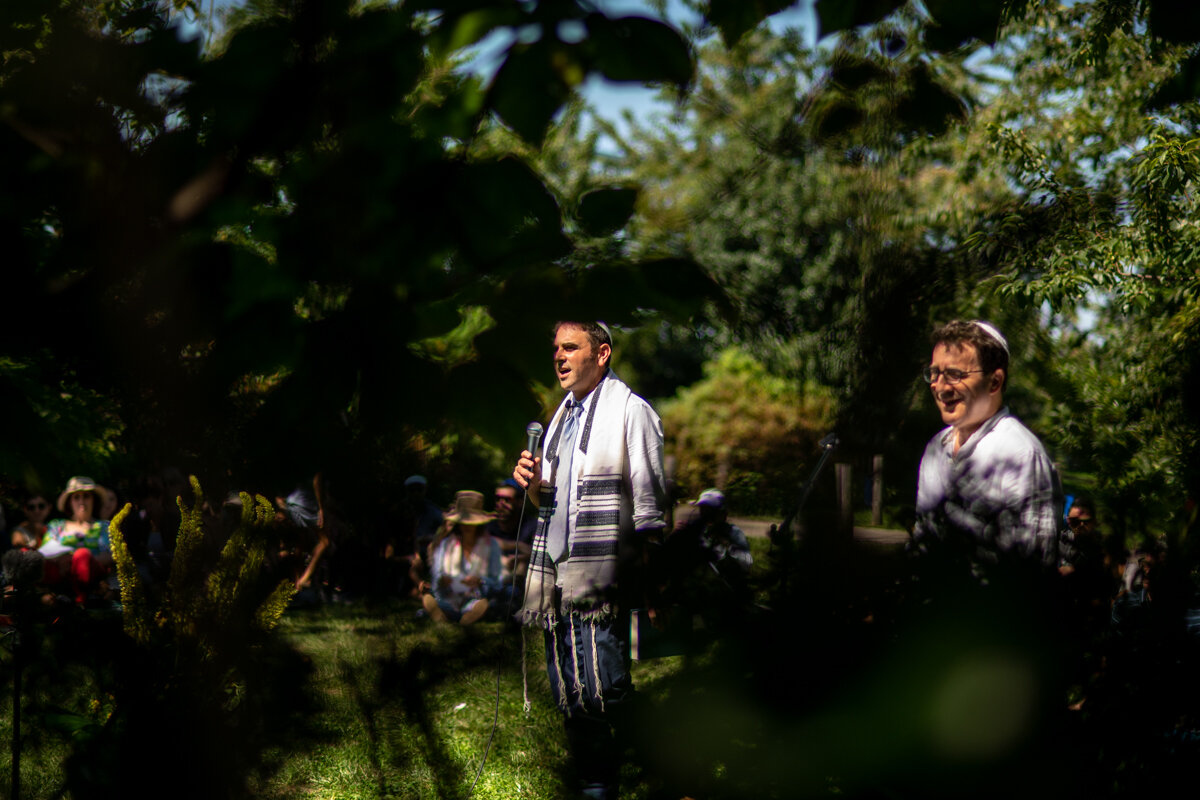A Beauty We Can Take Part In
Dear friends,
By the time we reached Neilah something had been transformed. One could sense the minds in the space were somehow softer, less busy, the bodies somehow lighter and the hearts sitting a touch closer to their original spot. I had experienced something like this toward the end of the day of Kippur before, but there was something special about this year. The density of fear, anxiety and instability all around us had something to do with it. The time we allowed ourselves to find where we are in the present moment also. The music, the ancient words, the coming together in person despite all the fears, and online despite screen-fatigue, the positivity and desire of each of us to create something together that comes out of our souls or kishkes or yearning or memories or hopes; these were the ingredients of our very special High Holidays services this year. On a personal note, these holidays were a far deeper experience for me in large part because I now know so many of you, whereas last year I was really just beginning to get to know you all. Thank you for being there with me, and for making these holidays so unique.
There were too many wonderful moments to recount, but to me the heart what happened this year were expressed by the two Torah readings, on the morning services of Rosh Hashanah and Yom Kippur. On Rosh Hashanah evening, in a Syrian piyyut we invoked God by the name Chai, meaning Life or Living, or Alive. This was the attempt in these experiential Torah readings, to make the experience of a Torah reading a living, breathing organism. My teacher, Rabbi Dovid Neiburg once likened the Torah to Adam’s lifeless body before God, in Genesis 2 blows the air of life into him:
וַיִּפַּ֥ח בְּאַפָּ֖יו נִשְׁמַ֣ת חַיִּ֑ים וַֽיְהִ֥י הָֽאָדָ֖ם לְנֶ֥פֶשׁ חַיָּֽה
G-d breathed into his nostrils the breath of life, and Adam became a living being.
The Torah is dead without us. It is a piece of dead animal skin with incomprehensible letters. Our job is to breathe the breath of life into it. We play God every time we read it.
Many of you expressed your appreciation of the way we read Torah this year. How Amy chanted the Hebrew, Chanan sang the translation and Frank blew his horn to express the sensuality of the words and the emotions expressed. Some told me they heard it as if for the first time, much like the ancient Israelites in front of the Gate of Water in Jerusalem in 445 BC. I think we all felt that this was different, new, of the moment.
It strikes me as very much what The New Shul tries to do in general. An ancient tradition that can be so stale and remote can become fresh and exciting when we blow some of our breath into it.
It’s a similar process, I think with forgiveness. When we come to examine our actions, our patterns of behavior, our failures with the judgement of our idea of what should be, with rigid notions of right and wrong, we get lost in what is no longer alive. When, and this happened to me this Yom Kippur over the course of the day, we manage to extricate ourselves from the clutches of dead ideas and bring ourselves into what simply is, we know the complexity of each of our mistakes, the forces beyond us that lead us to make them, with some of them we even know they weren’t mistakes after all, but the unfolding of our lives. This softer type of judgement is the lounge of forgiveness.
Reaching this space is what allows for Sukkot to emerge. The holiday of joy, of nature, of gratitude for what has been harvested, of the beauty of the transitory. My grandmother, Deana z”l, who died on the eve of Sukkot almost a decade ago, taught me that this is the holiday on which we read the Book of Ecclesiastes.
אִם־יִמָּלְא֨וּ הֶעָבִ֥ים גֶּ֙שֶׁם֙ עַל־הָאָ֣רֶץ יָרִ֔יקוּ וְאִם־יִפּ֥וֹל עֵ֛ץ בַּדָּר֖וֹם וְאִ֣ם בַּצָּפ֑וֹן מְק֛וֹם שֶׁיִּפּ֥וֹל הָעֵ֖ץ שָׁ֥ם יְהֽוּא׃
When clouds fill with water
they empty themselves onto the earth.
And when a tree collapses down south or up north,
in the place where it falls, there it will lie.
We are a part of these cycles of life, filling and emptying like the clouds, arriving and departing in the spots that are ours. That is a beauty we can accept. That is a beauty we can take part in. That is a beauty we can love.
I look forward to celebrating Sukkot with you in an easy meditation walk in Prospect Park on Tuesday evening. If you’ve never done one before, it’s a chill, pleasant experience.
Chag sameach!
Shabbat shalom,
Rabbi Misha

